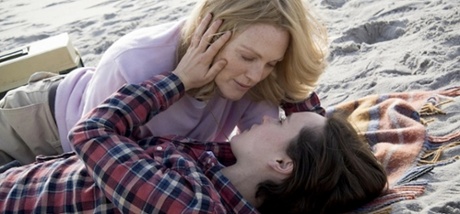
I first read Patricia Highsmith’s The Price of Salt (or Carol, as the film adaptation will be called) during a year abroad in Oslo, on a course module titled homotextuality: gay and lesbian literature.
While perfecting the art of discussing explicit novels in an academic scenario (there are only so many euphemisms for orgasm), I noticed that the trope of “queer woman converts younger hetero woman” appeared frequently throughout the lesbian canon. Novels such as Tipping the Velvet and Loving Her have this narrative, as do some well-known films: the 1996 Bound, directed by the Wachowskis, and the Palme d’Or-winning Blue Is the Warmest Colour, both show ostensibly straight women embarking on relationships after a slight nudge from a lesbian encounter. Converting the straight girl, it seems, is cinema’s idea of how the lesbian relationship functions.
Excitingly, for all those who feel a body of decent lesbian cinema is overdue, two films will be coming out later this year: the above-mentioned Carol, and Freeheld with Julianne Moore and Ellen Page. The adaptation of The Price of Salt stars Cate Blanchett in the older “experienced” role, and Rooney Mara as the disillusioned and adoring younger Therese, who is perceived as heterosexual until she encounters the glamorous Blanchett while working as a department-store sales assistant.
The age difference is stark, but beyond this, the narrative of lesbian conversion is there in all its problematic glory, throwing up questions about sexual identity and coercion. Not only by using an uncomfortable stereotype about predatory lesbians, but also by treating sexual identity as if it were a taste in food: here, try the asparagus; if you eat it enough you might like it.
Arguably, The Price of Salt is more complex than that. Therese seems unhappy in her heterosexual relationship, and for a novel published 18 years before the Stonewall riots, depicting two female characters in the same format as that of a heterosexual love story – ie, no conversion necessary – would perhaps have been too revolutionary, even in its banality. However, it is exactly this banality – the right to have a love story that doesn’t require a transformation or conversion – that lesbian cinema, like all romantic films, should aspire to depict. Indeed, the conversion trope itself is probably a response to the difficulty in depicting real lesbian relationships – they have to be couched in stereotypical terms for mainstream audiences to connect with.
Freeheld, a new film by Peter Sollett, follows the story of a lesbian couple fighting to be recognised legally after Julianne Moore’s character is diagnosed with lung cancer. It is based on the true story of US police officer Laurel Hester’s fight for equal rights, and perhaps its unavoidable realism is the key to the film’s ability to avoid the coercion convention. Although there is a 19-year age difference between them, both women seem fully aware of their sexual identity, and the film breaks the predatory-lesbian mould by depicting a love story that is exceptional in its normality of two women just being in love. (“A house, a dog, a woman I love who loves me” is the joint dream for the couple.) Not only that, but the film actually uses a gay actor to play a gay woman. I know.
At its worst, the predatory-conversion trope is simply offensive to lesbian women; at its least-worst, is just a realisation of how difficult it can be to navigate queer identity in a still-homophobic society. The recurrence of the cliche is one that will hopefully disappear as being public about your queer identity becomes easier, and we begin to recognise that lesbian women can have boring, conventional love stories just like anyone else.

